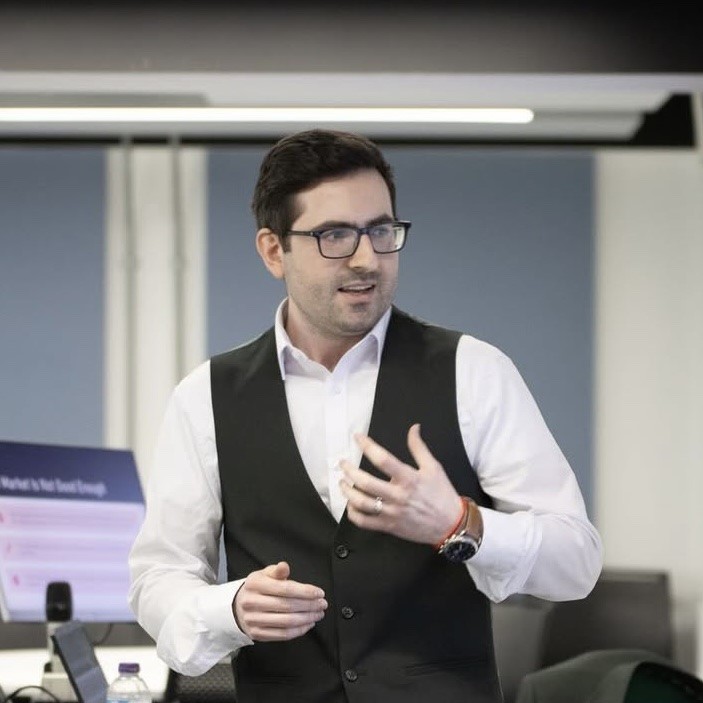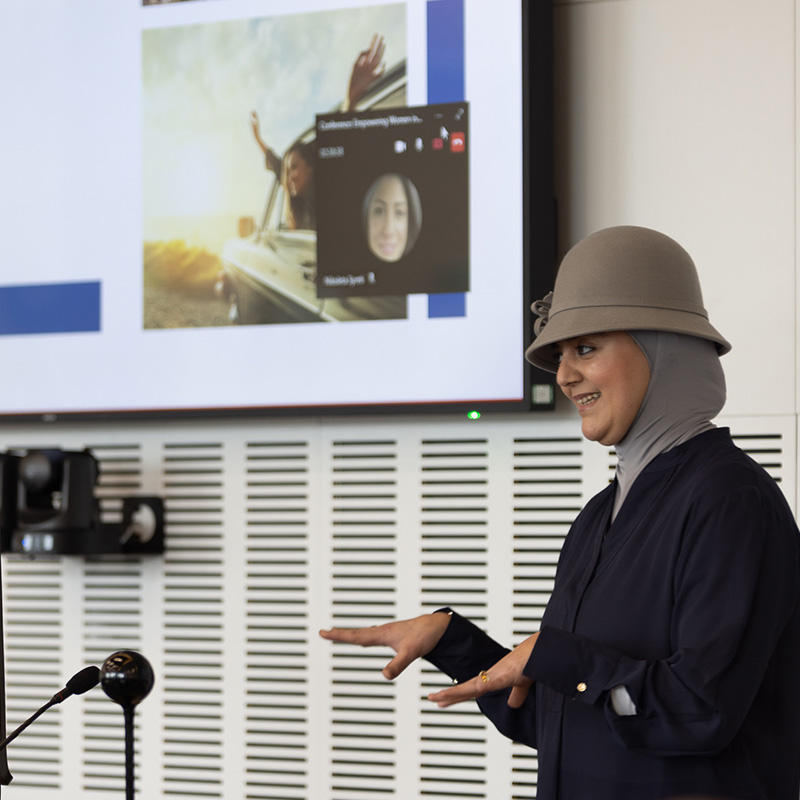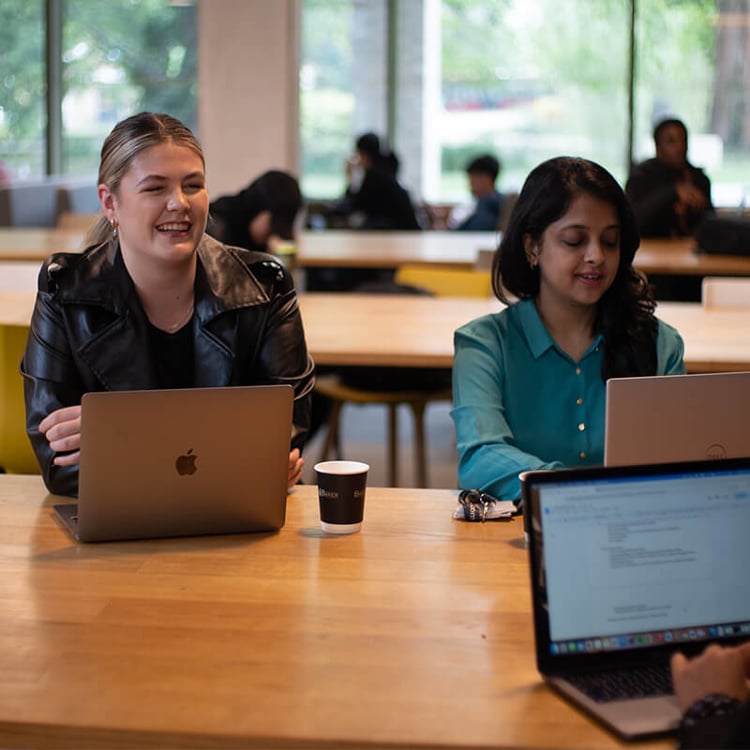Entry tariff:
112–128 UCAS points (or equivalent)
Foundation Year: 64–80 UCAS points (or equivalent)
International Foundation Pathway:
64 UCAS (or equivalent)
IELTS: 5.5
UCAS code:
N191
NN13 (if choosing Foundation Year)
Start date(s):
January 2026
April 2026
September 2026
Don't just study business - create it!
Our Business Management and Entrepreneurship course will give you the mindset, capabilities, and confidence to lead innovation, launch ventures, and drive impact across commercial, social, and civic sectors.
Through immersive business experiences, entrepreneurial simulations, and access to real venture-building opportunities, you will learn by doing. Whether your ambition is to start a business, scale innovation within an organisation, or lead community-driven initiatives, this course provides the critical tools, networks, and applied learning needed to succeed.
You will join a vibrant ecosystem anchored by The Business Laboratory, our dedicated hub for enterprise and innovation, and benefit from direct access to initiatives such as The Enterprise Exchange, The LaunchPad Accelerator, and the EWIE Conference (Empowering Women in Entrepreneurship).

Why study business management and entrepreneurship at Roehampton?
Gain a competitive edge by tackling current entrepreneurship challenges, exploring ideas and be supported by industry specialists.

Real world, practice-based learning
You will develop applied business and innovation skills through venture sprints, consultancy briefs, and entrepreneurship challenges. You will explore new ideas and test business models in live settings, supported by industry mentors, founders and investors.

Flexible and professional structure
You will study on campus two days per week, enabling flexibility for part-time work, internships, or venture development alongside your academic journey. There will be no written exams, assessment is entirely rooted in applied learning and real business dilemmas.

Enterprise-led graduate preparation
Right from the start, you will engage in professional development and entrepreneurial projects that will build your confidence, creativity, and commercial awareness. The final year includes a Capstone Career Pathway Project with the option to undertake a consultancy, research, or sustainability-focused brief.
Are you an international student? You can take this course with an International Year 1, where you’ll get extra research and academic support and improve your English language abilities, so you can confidently progress onto the second year of your degree.
Modules
These are the current planned modules on this course and may be subject to change.
These are the modules you will take if you join us from April 2026 onwards.
30 credits
This module will equip you with the financial knowledge and practical skills necessary for understanding and managing financial decisions, both personally and professionally.
You will be introduced to key financial principles including financial statements, investment appraisal, budgeting, risk analysis, and sustainability in finance. By incorporating tools such as Excel and real-life case studies, the module builds financial literacy and analytical thinking from the ground up.
A special focus is placed on fostering financial resilience, enabling you to understand the impact of financial decision-making in both small businesses and larger organisations.
Teaching and learning
You will be taught through lectures and workshops that involve a range of learning and teaching approaches, which includes online support and employability-related activities.
Lectures will cover core material, while workshops will consist of a blend of interactive activities, group work exercises and debates on set topics designed to support your skills development.
Assessment
This module will be assessed by case study coursework (30%) and reflective journals (70%).
30 credits
You will develop your talent, skills and competencies through focused business readiness activities and live global multicultural challenges. We apply industry specific knowledge; use practical case examples; live case studies and issues to draw out the skills and professional attitudes valued by employers; theoretical models and concepts to enable you to gain an understanding of industry requirements helping you transition into employment or entrepreneurship. We use a coaching approach to teaching to build confidence, critical thinking and embed learning into practice.
The module also allows for skill development, competencies in written academic, verbal and technological enquiry/research activities to help you progress through your chosen degree of study. It lays the foundation for further competency development needed to progress through each year which will be built on by other modules. You will engage in learning activities which develop your inclusive leadership skills and competencies in working in global and multi-cultural settings.
You will learn how to transform yourself professionally, enhance your career trajectories, and excel in your chosen fields while navigating the challenges of technological advancements, ethical and sustainability dilemmas, and the evolving demands of the modern workplace.
Topics covered include:
- Developing business sector awareness in team situations and meeting industry challenges
- Inclusive leadership and sustainability practices
- Your future careers, talent management, recruitment and selection, reflective practice, academic skills and technology working
Teaching and learning
You will be taught through lectures and workshops that involve a range of learning and teaching approaches, which includes online support and employability-related activities.
Lectures will be developed around the key concepts, models and frameworks around employability and the world of work, technology and competency development, talent acquisition, careers development and enterprise development.
Seminars will concentrate particularly on the elaboration of specific theoretical approaches with reference to their possible application through the selection of case examples, live business challenges, simulated recruitment and selection activities.
Assessment
This module will be assessed by a professional pitch and personal brand portfolio (50%) and a reflective report (50%).
30 credits
You will be introduced to key concepts and issues relating to business organisations in global environments.
You will focus on globalisation and the different types and objectives of business organisations. You will then cover a range of topics related to assessing the environments within which businesses operate such as economic growth, international trade and global industries. The link between business organisations and environments is further examined within the context of analytical frameworks such as PESTLE, Porter's 5 Forces and Demand/Supply analysis.
Teaching and learning
You will be taught through lectures and workshops that involve a range of learning and teaching approaches, which includes online support and employability-related activities.
Lectures will cover core business environment concepts and analytical frameworks, while workshops will engage you in solving practical global business challenges and strategic decision scenarios.
Workshops will consist of a blend of interactive global business simulations, group work on international market analysis and strategic decision-making exercises, and debates on contemporary global economic issues designed to support analytical and cross-cultural communication skills development.
Assessment
This module will be assessed by a reflective journal (30%) and coursework (70%).
30 credits
You will gain a comprehensive introduction to the core marketing concepts and the essential role of data in shaping marketing decisions. You will explore key topics including segmentation, targeting and positioning (STP), the marketing mix, and customer value, gaining a solid foundation in how organisations identify and respond to consumer needs.
A strong emphasis is placed on developing practical skills in market research and data analysis. You will work with industry-standard tools such as Mintel and Statista to interpret market reports and analyse consumer trends. The module also introduces the fundamentals of data in a marketing context covering types of data, key sources, and the growing relevance of big data.
Through hands-on sessions, you will use Microsoft Excel to organise, and analyse market data, applying advanced formulas and functions to draw meaningful consumer insights. Core statistical concepts such as mean, median, mode, standard deviation, correlation, and simple linear regression will be introduced to support predictive analysis.
By the end of the module, you will understand how to apply data-driven consumer insights to inform decisions around product development, pricing, promotion, and distribution, laying the groundwork for further study and real-world marketing practice.
Teaching and learning
This module combines lectures, interactive workshops, and practical sessions to ensure you develop both theoretical understanding and applied skills in marketing and data analysis. You will also have access to online suppirt and employability-related activities.
You will engage in weekly lectures to explore key marketing concepts such as STP, the marketing mix, and customer value. These sessions will be supported by computer-lab sessions where you will use Mintel and Statista to conduct market research and analyse consumer trends.
To encourage independent learning, you will be asked to conduct case study research, analyse competitor data, and discuss your findings in small groups. You will also be guided through the process of developing a marketing plan for a new or improved product, applying both consumer insights and data-driven analysis.
Assessment
This module will be assessed by a data analysis report (30%) and a marketing report (70%).
These are the current planned modules on this course and may be subject to change.
30 credits
This module helps you understand the challenges organisations face in a changing world influenced by climate change, social and political developments issues, technology, and workplace shifts at a local and global level.
Organisations and their leaders must be suitably adaptable and skilled at every level. The module provides frameworks for decision-making involving all stakeholders, focusing on sustainability, business ethics, social change (equity and social justice), climate change, and active citizenship.
Through case studies, you will tackle issues like governance (employees, managers, communities, consumers, shareholders, collective representation, e.g., trade unions, and so forth), ethical decision making, and the links to social justice. The primary focus and golden thread of this module is addressing the multiple challenging, complex issues that organisations, and the people therein, encounter, ensuring that their values remain consistent and intact in everyday practice.
This module equips you with the skills to navigate a rapidly changing business and social context, emphasising critical engagement with values in political change, influencing change management, and sustainability, key 21st-century employability skills.
Teaching and learning
Each week, you will engage in a meticulously organised learning experience comprised of lectures, an intensive workshop, and an additional 30 minutes of online support.
Lectures are designed to introduce and elaborate upon key concepts and frameworks relevant to the principal areas of the module. These sessions are based on indicative course content, aiming to equip you with a robust theoretical foundation.
Lecture topics will cover a broad spectrum of examples and case-based learning drawn from business ethical practices, values in leadership, sustainability, organisations, citizenship, and societal contexts to illustrate the practical applications of these concepts.
Workshop sessions are intended to delve deeper and put into practice the theoretical approaches discussed. These seminars focus on detailed examination of business case studies. You will analyse various scenarios likely to arise in organisational, management, and situations covering both business and public sector environments.
Assessment
This module will be assessed by a individual community-project report (50%) and a 10-minute group presentation (50%).
30 credits
This module introduces you to the core principles and practices of project management, with a specific focus on their application within entrepreneurial and early-stage venture contexts. Unlike traditional corporate project settings, entrepreneurial environments often require leaner, more adaptive planning approaches due to uncertainty, resource constraints, and rapid iteration.
As such, you will develop the capacity to manage ambiguity, navigate change, and deliver value through disciplined but flexible project delivery methods.
You will be introduced to a range of project management methodologies including Waterfall, Agile, and Lean Startup, allowing you to critically assess which approach is most appropriate depending on project scope, timing, resources and stakeholder complexity. These frameworks are applied through practical exercises and software tools such as Gantt charts, Work Breakdown Structures (WBS), Kanban boards, and PIDs (Project Initiation Documents).
Through scenario-based learning and industry-informed simulations, you will explore the full project lifecycle - from initial scoping and planning, to execution, monitoring, and closure. Attention is given to risk identification and mitigation, stakeholder engagement, budgeting, and the use of key performance indicators (KPIs) to track progress.
The module places strong emphasis on communication and teamwork, where you will be expected to present your project proposals in professional formats, including project posters and written reports, as well as participate in pitch simulations aimed at securing mock investment or executive support.
Teaching and learning
You will be taught through lectures and workshops that involve a range of learning and teaching approaches, which includes online support and employability-related activities.
Lectures will cover core project management principles and enterprise methodologies, while workshops will consist of a blend of interactive project planning activities, group work on stakeholder management and risk assessment exercises, and peer feedback sessions on project pitches designed to support your leadership and project coordination skills development.
By integrating startup case studies, software tools and investor-style evaluation panels, the module provides you with a professionally focused, applied understanding of how to manage entrepreneurial projects effectively. You will learn how to respond to evolving business contexts, justify project decisions using data, and balance innovation with execution discipline.
Assessment
This module will be assessed by a presentation (30%) and coursework (70%).
30 credits
This module provides you with a comprehensive foundation in the processes and principles underpinning the early stages of entrepreneurial venture creation. It centres on the identification, evaluation and shaping of opportunities within dynamic market environments, with a strong emphasis on problem-solution fit and customer value creation.
You will be introduced to a suite of entrepreneurial tools and frameworks, including lean startup methodology, the Business Model Canvas, customer discovery techniques, and value proposition design. Through structured learning activities and practical workshops, you will learn how to systematically observe and analyse unmet needs in markets, test assumptions, and iterate on early-stage concepts in response to real or simulated stakeholder feedback.
Key topics include market gap analysis, industry and competitor mapping, minimum viable product development, financial viability assessment, and digital storytelling techniques for early-stage pitching. The module is deliberately experiential, engaging you in simulation challenges, group ideation tasks and interactive peer critique to foster critical thinking, resilience and entrepreneurial creativity.
Teaching and learning
You will be taught through lectures and workshops that involve a range of learning and teaching approaches, which includes online support and employability-related activities.
Lectures will cover core entrepreneurial concepts and opportunity identification methodologies, while workshops will engage you in developing practical venture concepts and opportunity validation exercises aimed at supporting and consolidating their learning.
Assessment
This module will be assessed by a video pitch (70%) and an opportunity report (30%).
30 credits
Innovation is not only a catalyst for competitive advantage but a strategic imperative in an era defined by disruption, digital transformation, and rapid socio-economic change. This module will provide you with an in-depth exploration of the principles, practices, and evolving contexts of innovation management within both entrepreneurial start-ups and complex, established organisations.
You will be introduced to key innovation domains including disruptive innovation, business model innovation, platform strategies, design thinking and open innovation ecosystems. Contemporary challenges such as AI integration, sustainability-led innovation and the ethics of emerging technologies are embedded throughout, enabling you to engage critically with real-world applications and dilemmas.
Central to the module is the development of a nuanced understanding of how innovation generates both economic and societal value - and the strategic, cultural and organisational conditions necessary to sustain it over time.
You will learn to recognise innovation not just as a creative act, but as a structured, iterative and risk-aware process that can be designed, managed, and scaled. The module cultivates strategic thinking, opportunity recognition, creative problem-solving, and innovation leadership. It will prepare you for innovation-related roles in areas such as product development, digital strategy, consultancy, corporate entrepreneurship, and intrapreneurship.
Teaching and learning
You will be taught through lectures and workshops that involve a range of learning and teaching approaches, which includes online support and employability-related activities.
Lectures will cover core entrepreneurial concepts and opportunity identification methodologies, while workshops will engage you in developing practical venture concepts and opportunity validation exercises aimed at supporting and consolidating their learning
Through interactive learning, such as live case simulations, innovation sprints, and panel discussions with industry practitioners, you will apply innovation management frameworks to complex, dynamic business scenarios.
Assessment
This module will be assessed by a group innovation video and visual artefact (50%) and an individual applied essay (50%).
These are the current planned modules on this course and may be subject to change.
Professional Experience Year
This course also offers the option of a Professional Experience Year. This programme combines dynamic career modules with flexible placement opportunities. After completing your first year of study, you'll then spend the next academic year completing your Professional Experience training as part of your degree. This will give you real career experience. This unique opportunity offers you distinct paths to build your expertise.
Find out more about our Professional Experience Year
This course also offers all students the option of a one-year paid work placement, to boost your employability even further. If you choose this route, you will take the placement following year two of your course, and then return to complete your degree.
Why take a placement?
A placement year is the perfect opportunity to gain valuable work experience, to build on the career skills we will teach you on this degree. The connections you make on the placement will improve your career prospects further, and equip you with the skills you need to secure graduate-level employment.
How we support you
The University's Placement and Work Experience Team are experts at helping you to secure a placement. They will work closely with you from the start, helping you research potential employers, discover placement opportunities, create and pitch your CV, and will coach you to perform well in interviews. We aren't able to guarantee a placement, but our sector-leading advisors will give you the best possible chance of securing one.
Find out more about how we'll support you
We understand that your plans might change once you start your programme. If you decide not to do a placement, you will have the option of completing the three year version of your programme.
Whatever your choice, you will have access to many opportunities for work experience through our Placement and Work Experience Team, and access to face-to-face and 24/7 online careers support.
30 credits
This module integrates the core principles of entrepreneurship by guiding you through the end-to-end process of developing a new venture, from ideation to investment readiness. Building on concepts introduced in earlier modules, you will be challenged to take an original or refined business idea and transform it into a fully developed and professionally presented business proposition.
You will begin with ideation and opportunity refinement, supported by structured market research and validation techniques. The module places emphasis on evidence-based decision-making, encouraging you to test your assumptions through competitor analysis, customer feedback, and business model experimentation. The Business Model Canvas is used extensively to develop, iterate, and articulate the value creation logic of the proposed venture.
As the module progresses, you will develop a comprehensive strategic business plan. This includes sections on marketing and customer acquisition strategy, financial planning and projections, operational and human resource structures, and consideration of legal and regulatory compliance. You will also be introduced to methods of securing funding, including angel investment, venture capital and alternative finance, enabling you to design financially viable and fundable ventures.
Throughout the module, you will participate in collaborative workshops and receive feedback from tutors and peers on key elements of your business plan and pitch deck. You will be encouraged to critically evaluate your own ideas in light of commercial viability, scalability, ethical considerations, and social or environmental impact.
Teaching and learning
You will be taught through lectures and workshops that involve a range of learning and teaching approaches, which includes online support and employability-related activities.
By the end of the module, you will have not only produced a fully integrated and investment-ready business plan but also gained the confidence and professional competencies required to present yourself as credible, opportunity-driven entrepreneur ready to navigate the realities of venture creation.
Assessment
This module will be assessed by a business plan report (30%) and an investor pitch presentation (70%).
30 credits
In an ever-changing world, organisations must make strategic choices based on solid analyses and decision-making processes. This module adopts an innovative teaching approach to illustrate how strategic management theories and models can be applied in different contexts and how they inform decision-making.
You will develop a skill set founded on strategic management theory that will allow you to become an active participant in the strategy process that organisations deploy to ensure their long-term success.
This module will give you a clear understanding of what strategy is all about and how organisations develop it. You will learn how to apply the essential concepts and tools of strategy that will be useful in their business career whichever sector they choose.
Main topics revolve around the strategic position of organisations, the concept of competitive advantage (how to gain competitive advantage and/or sustain it for longer), and evaluation of business strategies. After a closer look at business and corporate levels of strategy, the module ends with selected aspects of implementation.
Teaching and learning
You will be taught through lectures and workshops that involve a range of learning and teaching approaches, which includes online support and employability-related activities.
Seminars will involve critical analysis of real-life cases to address a range of strategic problems. In this way, you will develop commercial awareness and recognise drivers for business success. You will also have the opportunity to work with others and communicate your views.
Assessment
This module will be assessed through a strategic analysis report (50%) and a recommendation report (50%). Using insights from Assessment 1, you will produce a strategic options report using the relevant frameworks.
30 credits
This intensive six-week taught module is designed to equip you with the essential competencies needed for professional consultancy practice.
This module serves as the skills-based foundation for the concurrent Roehampton Live Project, providing you with theoretical frameworks, practical tools, and professional capabilities required to deliver high-quality consultancy services to real clients.
Delivered as a professional bootcamp in a blocked format, this module creates an immersive learning environment where you will develop expertise in consultancy methodologies, client relationship management, strategic problem-solving, and professional communication. The intensive structure enables you to build confidence and competence before engaging with live client projects.
You will learn to integrate ethical considerations, social responsibility, and environmental sustainability into your consultancy approach, ensuring that your professional practice contributes to broader societal wellbeing.
Key areas of focus include consultancy frameworks and methodologies, client engagement and relationship management, evidence-based research and analysis techniques, strategic thinking and recommendation development, professional communication and presentation skills, and ethical consultancy practice and sustainability integration.
You will engage in real case studies and simulated client scenarios, working individually and in teams to apply learned concepts. The module incorporates guest speakers from industry, practical workshops, and reflective exercises to bridge theory and practice effectively.
This module prepares you for immediate application of skills in your concurrent Live Project module, where you will work with real clients as part of the ‘Roehampton Business Advice Centre’.
Teaching and learning
The module employs intensive blocked delivery with high contact hours to create an immersive professional development experience. Teaching methods include interactive workshops, case study analysis, simulation exercises, guest speaker sessions, and peer learning activities.
You will have 22 hours of lectures and 33 hours of workshops over six weeks. Lectures and workshops will be interactive in nature providing an environment for sharing business ideas, problem space mapping and evaluation opportunities and carrying business scoping exercise.
Assessment
This module will be assessed through consultancy toolkit portfolio coursework (50%) and a consultancy bid presentation (50%).
30 credits
This transformative capstone module is designed to bridge the gap between academic study and professional practice. You will have the opportunity to apply your academic knowledge in a real-world setting, developing strategic solutions to real-world business challenges.
You will work in consultancy teams as part of the Roehampton Business Advice Service, collaborating with a diverse range of external clients, including small and medium enterprises (SMEs), non-profit organisations, social enterprises, and larger companies. Global engagement projects will also be sought with partners outside of the UK, or projects that can have an influence on communities globally.
Each team will engage with a client to diagnose business problems, conduct in-depth research, and formulate evidence-based recommendations. By making an impact through real-world projects, you will enhance your ability to navigate complexity, synthesise information, and communicate your insights effectively to senior stakeholders.
While teamwork is a core aspect of this module, you will also undertake substantial individual work, ensuring that your personal contributions are critically assessed and aligned with your professional aspirations. The module is structured to simulate a professional consultancy environment, equipping you with the practical skills, commercial awareness, and adaptability needed for leadership roles in business and beyond.
You will be encouraged to develop ethical, socially responsible, and sustainable business solutions, ensuring that your recommendations contribute not only to organisational success but also to broader societal and environmental wellbeing.
Through a combination of practical experience, academic rigor, and reflective work-based learning, you will be empowered to become a strategic thinker, problem solver, and an influential professional. The module is designed to be a stepping stone into a range of career paths, with projects aligned with your own career goals. By the end of this module, you will have built a portfolio of high-quality work that demonstrates your analytical, decision-making, and communication skills.
Teaching and learning
Each consultancy team will be assigned an academic supervisor who will provide structured guidance, feedback, and oversight throughout the project.
You will have scheduled supervision meetings, including meetings with your supervisor at key milestones during the project to discuss progress, challenges, and next steps. Supervisors will support you in managing client relationships and ensure professionalism in communications.
Assessment
This module will be assessed by a consultancy report (50%) and a live presentation (50%).
These are the current planned modules on this course and may be subject to change.
This course offers a foundation year, which takes place at the beginning of your studies. Studying a foundation year will give you academic and practical experience, and a strong introduction to your subject, ensuring you succeed on your undergraduate degree.
30 credits
You will develop your core academic and integrated English language skills of speaking, listening, reading and writing. You will become familiar with key academic skills and concepts, such as referencing methods and awareness of academic integrity and tone. You will apply these skills and knowledge to both broad topics and also your chosen subject pathway.
Teaching and learning
You will be required to actively engage in on-campus learning for up to 10 hours a week.
You will be taught through a full range of teaching and learning methods, which include lectures, seminars, workshops, discussion groups, group directed tasks and presentations. This will enable you to learn from your peers and tutors in both structured and information settings.
You will be encouraged to think creatively about your approach to learning and discussions with your peers. You will also have access to recordings, resources, links and signposting through Moodle to enrich your learning.
Assessment
You will be assessed through group and individual presentations, comparative and reflective essays, multiple choice exams, coursework and reports, oral exams, portfolios, case studies and blogs.
30 credits
You will develop your research, numeracy and information technology skills. You will investigate the difference between primary and secondary research, conduct your own research project and demonstrate your findings through data analysis. You will also develop your awareness of equality, diversion and inclusion in the UK, through a real-world issue; discrimination in the workplace.
Teaching and learning
You will be required to actively engage in on-campus learning for up to 10 hours a week.
You will be taught through a full range of teaching and learning methods, which include lectures, seminars, workshops, discussion groups, group directed tasks and presentations. This will enable you to learn from your peers and tutors in both structured and information settings.
You will be encouraged to think creatively about your approach to learning and discussions with your peers. You will also have access to recordings, resources, links and signposting through Moodle to enrich your learning.
Assessment
You will be assessed through group and individual presentations, comparative and reflective essays, multiple choice exams, coursework and reports, oral exams, portfolios, case studies and blogs.
30 credits
This module provides you with a foundational understanding of the principles and practices of business. You will explore the fundamental concepts of business environments, legal structures, and organisational dynamics, focusing on small and large businesses.
With the introduction of key principles of sustainability, social responsibility, and inclusive business practices in a globalised economy, it is expected that you will develop an understanding of contemporary issues affecting businesses at both local and global levels. The transferable skills you will develop in taking this module will enable you to critically evaluate new business ventures, create mission and vision statements, and engage in collaborative activities to develop essential teamwork and communication skills.
The module follows a thoughtful combination of theory, applied learning and reflective practices. By emphasising real-world applications, ethical considerations and global awareness, you will become a responsible, skilled and adaptive business professional.
Teaching and learning
Through interactive workshops, role-play activities, and case studies, it is expected that you will develop practical skills in business planning, stakeholder analysis, and strategic thinking.
The teaching delivery for each module consists of one, one-three-hour lecture and one, two-hour seminar per week. Seminars will consist of individual, group activities and role plays.
You will also have an additional 30 minutes of online support each week, which will consist of individual tasks such as quizzes, posting on discussion forums, watching videos and taking notes and reading.
Assessment
This module will be assessed using a business pitch and an individual written report.
40% - formative assessment where you will identify sources of business ideas (300 words) and summative assessment, where you will be required to present a business pitch to an audience of investors.
60% - individual written report, using a start-up company of your choice to identify and evaluate key challenges faced.
30 credits
This module delves deeper into core business functional areas and includes topics such as: marketing, finance, Human Resource Management (HRM) and leadership. The module is structured to enable you to gain an understanding of analytical frameworks such as SWOT, PESTLE and Porter’s Five Forces that will enable you to evaluate as well as identify opportunities and challenges within different business environments. The transferable skills you will develop in taking this module will enable you to critically evaluate the key functional aspects of business operations and application of theory to practice.
You will also evaluate the principles of product life cycle, and business portfolio management. This exploration will further develop your foundational skills that will enable you to deal with real-world business challenges and engage in critical discussions. Additionally, the module design follows a thoughtful combination of theory, applied learning and reflective practices, emphasising real-world applications, ethical considerations and global awareness, preparing you to become a responsible, skilled and adaptive business professional.
Teaching and learning
This module will be delivered to ensure active interactions through workshops and seminar activities while focusing on practical applications, such as cost behavior, breakeven analysis, market research, recruitment processes, and globalisation.
The teaching delivery for each module consists of one, one-three-hour lecture and one, two-hour seminar per week. Seminars will consist of individual, group activities and role plays.
You will also have an additional 30 minutes of asynchronous digital support each week, which will consist of individual tasks such as quizzes, posting on discussion forums, watching videos and taking notes and reading.
Assessment
This module will be assessed using a group presentation and an individual written report.
40% - group presentation, where you will use relevant tools to evaluate the macro environment of a business organisation of your choice.
60% - individual written report, acting like an independent management consultant, you will write an analytical business report on a company of your choice on how it can gain or increase its competitive advantage.
These are the current planned modules on this course and may be subject to change.
“The Business Management and Entrepreneurship degree gave me the skills, mindset and support to step into the real world feeling ready. Roehampton shaped me into someone who can lead, adapt and make an impact.”
Cheska, BSc Business Management graduate
Careers
With hands-on projects, live briefs, and career-focused learning built into every stage of your course, you'll graduate ready to meet industry needs.
With our BSc Business Management and Entrepreneurship, you’ll leave Roehampton ready to launch or scale ventures, lead innovation and strategy roles, advise on entrepreneurship policy or impact enterprise and work in business development, marketing, product or consultancy.
You could pursue a career as:
- Innovation Manager
- Social Enterprise Leader
- Start-up Founder
- Strategy Consultant
- Business Analyst
- Entrepreneur-in-Residence

The Student Futures team is here to support you throughout your time at Roehampton and beyond.
They offer services tailored to your needs, helping you take confident steps towards your future.
You’ll have access to a wide range of career workshops and events, where you can engage with employers and develop the skills you need to succeed in the workplace.
These opportunities will help you build your CV, prepare for interviews, and connect with successful Roehampton graduates who are thriving in their careers. You’ll also be able to engage with our partners across London and beyond.
Wherever you want to go in the future, you'll be preparing for the world of work from your very first day.
Continue your studies at Roehampton
Once you've graduated, you could study one of our specialist postgraduate courses:
Learning & assessment
You will learn by doing through simulating the real-world conditions entrepreneurs face.
You’ll engage with current challenges, work in teams, and develop solutions through case-based and experiential learning.
With just two immersive days on campus per week, you’ll gain the flexibility to reflect, innovate and grow your entrepreneurial capabilities.
You will have plenty of opportunities to test your knowledge by analysing real business cases to understand strategy, opportunity and innovation. These cases are often based on real events, encouraging you to apply theoretical concepts to practical situations.
You will take part in venture simulations, start-up labs and innovation sprints. In your final year, you can undertake a capstone project, where you can choose from a range of pathways from research to sustainability-focused interventions.
If you’re interested in more extensive industry immersion, our optional Professional Experience Year will give you valuable opportunities to apply your learning to real-world settings, as well as developing your employability skills, and building your industry connections.
We will empower you to develop your mindset and confidence through development feedback, mentoring and reflective practice. You’ll gain key skills in resilience, adaptability and professional self-awareness and put yourself in a confidence place for future study or employment.
We don’t do exams. We do dilemmas.
- You'll be assessed through pitch presentations, investor decks, business strategy simulations, innovation audits, reflective journals, and team-based projects
- You'll use platforms and tools such as Moodle, Trello, Padlet, and AI-supported planning platforms to reflect contemporary workplace environments

Programme Leader & Founder of The Business Labroratory
Bari Mari, FRSA FNIMA MInstP
What excites me most about this course is that it’s not just about studying business – it’s about building it.
I have the privilege of teaching students who are curious, bold and passionate about creating something real. Whether they go on to launch ventures, lead innovation in organisations or spark change in their communities, they leave this programme equipped with confidence, critical thinking and practical experience.
It’s a joy to see ideas transform into action – and to walk alongside students as they shape their own entrepreneurial journeys.

Opportunities & facilities
At Roehampton, you will become part of a values-led, globally conscious academic community where innovation, sustainability, and inclusive leadership are central to how we teach, learn and build the future.

Roehampton Business Laboratory
Our enterprise incubator will support you in developing and scaling entrepreneurial ideas.
It also houses signature initiatives like the RISE Prize and the Dragon's Den Style Launchpad showcase.
Celebrating innovation at the LaunchPad start-up awards 2025

EWIE & The Enterprise Exchange
Participate in flagship events designed to accelerate visibility, voice, and impact for emerging founders. The EWIE Conference brings together global women entrepreneurs, investors, creatives and policymakers for a day of dialogue and action.
Empowering Women in Entrepreneurship Conference returns to Roehampton

World-class library
Home to hundreds of thousands of books, over 1,000 seats, and modern, collaborative and silent study spaces. You'll also have access to a vast range of online resources, like e-books, journals, and databases whenever you want.
Open days
Get a real taste of our campus, community and what it’s like to study at Roehampton
Applying
Full-time UK undergraduate students apply through UCAS.
Entry tariff
112–128 UCAS points (or equivalent)
Foundation Year: 64–80 UCAS points (or equivalent)
Looking to work out your UCAS points or find out about our entry requirements? Find out more.
When we consider applications to study with us, we form a complete view of your achievements to date, and future potential, and can offer flexibility in entry requirements. Find out more about our Contextual Offer scheme.
General entry requirements
International undergraduate students apply through our direct application system.
Entry tariff
112–128 UCAS points (or equivalent)
International Foundation Pathway:
64 UCAS (or equivalent)
IELTS: 5.5
Looking to work out your UCAS points or find out about our entry requirements? Find out more.
When we consider applications to study with us, we form a complete view of your achievements to date, and future potential, and can offer flexibility in entry requirements. Find out more about our Contextual Offer scheme.
General entry requirements
Fees and funding
UK students
Tuition fees
| Entry date | Undergraduate Year 1 | Undergraduate Foundation Year |
|---|---|---|
| April 2026 | £9,535 | – |
| September 2026 | £9,790 | £5,914 |
| January 2027 | £9,790 | – |
| April 2027 | £9,790 | – |
Prices shown are for the first year of your degree.
Funding your studies
We also provide other ways to support the cost of living, including on-campus car parking, hardship support and some of the most affordable student accommodation and catering in London.
International students
Tuition fees
| Entry date | Undergraduate Year 1 | Undergraduate Foundation Year | International Foundation Pathway | International Year 1 in Business |
|---|---|---|---|---|
| April 2026 | £16,950 | – | – | – |
| September 2026 | £17,628 | £17,628 | £17,628 | £17,628 |
| January 2027 | £17,628 | – | £17,628 | £17,628 |
| April 2027 | £17,628 | – | – | – |
Prices shown are for the first year of your degree.
Funding your studies
We also provide other ways to support the cost of living, including on-campus car parking, hardship support and some of the most affordable student accommodation and catering in London.





